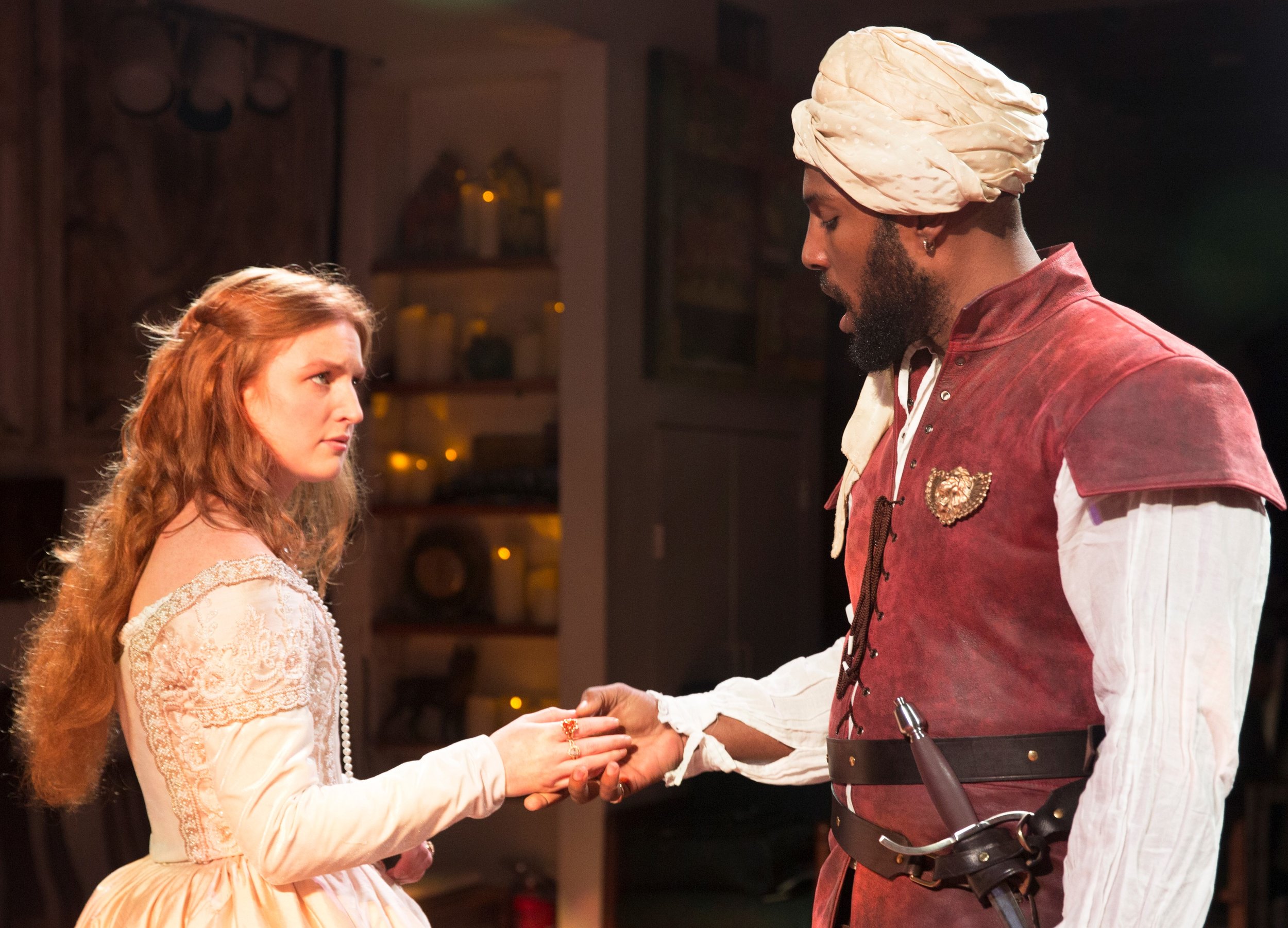Alanah Allen, as Desdemona, the wife of Othello, and Eliott Johnson as the eponymous character in the New Place Players’s site-specific staging of Othello at Casa Clara.
The New Place Players’ production of Othello at Casa Clara, a former foundry replete with balconies and staircases, is an unusual, site-specific staging that pulls the audience into the world of Shakespeare’s tragedy. Makenna Masenheimer directs the 1604 tragedy without a fourth wall, and a limited audience of 50 assures an intimate experience.
With seating on three sides of the space, the production employs acting, Lecoq movement, swordplay, and original live chamber music (by Anna Bikales, Flavio Gaete and Daniel Keene). To visually enhance the performance, the walls are decorated with shelved candles and stone sculptures that carry the patina of Renaissance Italy.
Rose Kanj plays the courtesan Bianca, and Matthew Iannone is Cassio, a Florentine officer serving under Othello. Photographs by Carol Rosegg.
It’s almost always Iago (Conor Andrew Hall) who runs away with the show, but here the whole ensemble delivers the theatrical goods—although some performers can wrap their mouths around the iambic pentameter more efficiently than others. But each actor makes an impression.
Eliott Johnson, in the eponymous role, certainly looks the part of a warrior. He also has the vocal heft to deliver Shakespeare’s verse through five acts. Yet his Moor comes across as a bit too tame for the military commander who brags that he “hath made the flinty and steel couch of war / My thrice-driven bed of down.” As the philosopher Stanley Cavell observed, the word “hell” is in the middle of Othello’s name. Johnson might do well to put a little more hell in his character and less civility. The actor has a raw fury when questioning Desdemona about the fatal handkerchief, but he needs to bring that same energy to other key scenes.
Hall succeeds as Iago when he’s intoning what are arguably some of the best passages in Shakespeare. Take his conversation with Othello in Act III, in which he hypocritically warns him about jealousy: “Oh, beware, my lord of jealousy! It is the green-eyed monster, which doth mock / The meat it feeds on.” Indeed, Hall has the chops for his part, but he could add more force to his conscienceless Iago if he punctuated his speeches with artful insinuation, pauses, and silence.
“Skillful lighting by Ethan Steimel gives familiar scenes an added dimension ... and underscores the moral struggle.”
While Matthew Iannone nails the noble mannerisms and social sophistication of his character Cassio, he speaks the language a tad too softly. Although he’s supposed to be the epitome of a Florentine aristocrat, it wouldn’t tarnish his character’s image if he upped the volume. (It doesn’t help that the live chamber music sometimes overwhelms the performers’ voices.)
What Masenheimer does with Desdemona (Alanah Allen), though, is remarkable. She has Allen make eye contact with audience members, almost as if this child bride hopes to persuade viewers that she is entitled to live her own life, in spite of the social mores of her day that urge a proper Venetian daughter to obey her father. Other Shakespearean women have had to choose between father and lover: Juliet, Rosalind, Cressida, and Ophelia. But Desdemona may well be the boldest and most straightforward young female in the canon.
One might think that the lack of a star would create a vacuum in this Othello. It doesn’t. Without the trappings of a conventional stage, spectators get to experience the drama at arm’s length from the performers.
From left: Allen plays Othello’s devoted wife Desdemona, Helen Herbert is Emilia, lady-in-waiting to Desdemona and wife of Iago, and Conor Andrew Hall is Iago, Othello’s villainous aide.
Skillful lighting by Ethan Steimel gives familiar scenes an added dimension, as in the first appearance of Brabantio (Matthew Dudley), Desdemona’s father, who’s illuminated as he peers out from his palace’s balcony, wearing an ornate nightgown and cap. As Iago lurks in the shadows with his gull Roderigo (Nathan Krasner) and informs Brabantio in animal language that his daughter has eloped with the Moor—“I am one, sir, that comes to tell you your daughter and the Moor are now making the beast with two backs”—the dramatic interplay of light and dark underscores the moral struggle going on within Brabantio, and, by extension, in the play at large.
Scrumptious period costumes by Jennifer Paar give the production a multilayered texture, underscoring class lines, status, and more: Othello’s exotic dress and African turban immediately mark him as “other,” in spite of his status as a respected general in Venice.
Although the celebrated soldier Othello never engages in an actual sword fight during the play, other characters do, and Aaron McDaniel’s fight choreography convincingly gives the audience a taste of clashing steel.
Shakespearean scholar G. Wilson Knight notes in his famous essay, “The Othello Music,” that "the Othello style is diffuse, leisurely, like a meandering river.” That’s precisely the fluidity that this 2½-hour New Place Players’ production achieves. Instead of being a slog to sit through, it’s an excellent tonic for the spirit.
The New Place Players’ production of Othello at Casa Clara (218 E. 25th St.) runs through March 25. Evening performances are at 7:30 p.m. on Wednesday, Thursday, Friday, and Saturday; matinees are at 2 p.m. Saturday and Sunday. For tickets and more information, visit newplaceplayers.org or telecharge.com.





